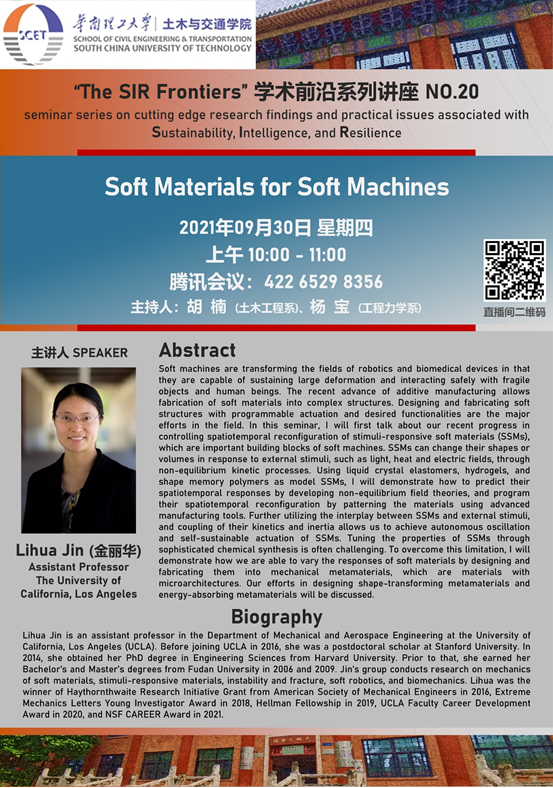题 目:Soft Materials for Soft Machines服务于软体机器的软材料
时 间:2021年09月30日周四10:00-11:00
地 点:腾讯会议 ID:42265298356 (若300人满请入直播间)
腾讯直播间:https://meeting.tencent.com/l/QALGLWoVMAcS
报告人:金丽华(加州大学洛杉矶分校,机械与航空航天工程系)
欢迎广大师生参加!
土木与交通学院
2021年09月27日

报告人简介:
金丽华,美国加州大学洛杉矶分校机械与航空航天工程系助理教授。2016年入职加州大学洛杉矶分校,此前为斯坦福大学博士后研究员。金老师分别于2006年和2009年在复旦大学获得学士和硕士学位,之后于2014年在哈佛大学获得工程科学博士学位。金教授课题组主要从事软材料力学、自响应材料、失稳与断裂、软体机器人、生物力学等方面的研究。金教授曾获2016年美国机械工程师学会Haythornthwaite科研专项资助、2018年Extreme Mechanics Letters青年研究者奖、2019年赫尔曼奖学金、2020年加州大学洛杉矶分校教师职业发展奖以及2021年美国国家科学基金会奖(CAREER)的获得者。
Lihua Jin is an assistant professor in the Department of Mechanical and Aerospace Engineering at the University of California, Los Angeles (UCLA). Before joining UCLA in 2016, she was a postdoctoral scholar at Stanford University. In 2014, she obtained her PhD degree in Engineering Sciences from Harvard University. Prior to that, she earned her Bachelor’s and Master’s degrees from Fudan University in 2006 and 2009. Jin’s group conducts research on mechanics of soft materials, stimuli-responsive materials, instability and fracture, soft robotics, and biomechanics. Lihua was the winner of Haythornthwaite Research Initiative Grant from American Society of Mechanical Engineers in 2016, Extreme Mechanics Letters Young Investigator Award in 2018, Hellman Fellowship in 2019, UCLA Faculty Career Development Award in 2020, and NSF CAREER Award in 2021.
报告摘要:
软体机器能够承受较大的变形,并安全地与易碎物或人类进行衔接交互,促进了当前机器人和生物医学设备领域的转变与发展。增材制造的最新进展使得制造软体材料复杂结构成为可能,目前该领域的前沿问题就是如何设计和制造具有可编程驱动和定制功能的软体结构。本次讲座中,金教授首先将介绍课题组对于控制环境响应型软体材料(SSMs)在时空重构方面的最新研究,这也是软体机器发展的重要基石。SSMs可以通过非平衡动力学过程响应外部的刺激(例如光、热和电场)来改变其形状或体积。本讲座将利用液晶弹性体、水凝胶和形状记忆聚合物作为SSMs模型,展示如何通过非平衡场理论来预测它们的时空响应,并利用先进的制造工具将材料模式化,以对其时空重构进行编程。接下来,将进一步利用SSMs与外部刺激之间的相互作用,以及它们的动力学和惯性的耦合,来实现 SSMs的自激振荡和自主驱动。然而通过复杂的化学合成来调整 SSMs特性通常比较困难。为了突破这一限制,本次讲座中金教授将展示如何通过软体材料设计和制造力学超材料(具有微结构的材料)来改变软体材料的响应。最后,金教授将分享其课题组在设计变形超材料和吸能超材料方面的研究。
Soft machines are transforming the fields of robotics and biomedical devices in that they are capable of sustaining large deformation and interacting safely with fragile objects and human beings. The recent advance of additive manufacturing allows fabrication of soft materials into complex structures. Designing and fabricating soft structures with programmable actuation and desired functionalities are the major efforts in the field. In this seminar, I will first talk about our recent progress in controlling spatiotemporal reconfiguration of stimuli-responsive soft materials (SSMs), which are important building blocks of soft machines. SSMs can change their shapes or volumes in response to external stimuli, such as light, heat and electric fields, through non-equilibrium kinetic processes. Using liquid crystal elastomers, hydrogels, and shape memory polymers as model SSMs, I will demonstrate how to predict their spatiotemporal responses by developing non-equilibrium field theories, and program their spatiotemporal reconfiguration by patterning the materials using advanced manufacturing tools. Further utilizing the interplay between SSMs and external stimuli, and coupling of their kinetics and inertia allows us to achieve autonomous oscillation and self-sustainable actuation of SSMs. Tuning the properties of SSMs through sophisticated chemical synthesis is often challenging. To overcome this limitation, I will demonstrate how we are able to vary the responses of soft materials by designing and fabricating them into mechanical metamaterials, which are materials with microarchitectures. Our efforts in designing shape-transforming metamaterials and energy-absorbing metamaterials will be discussed.



